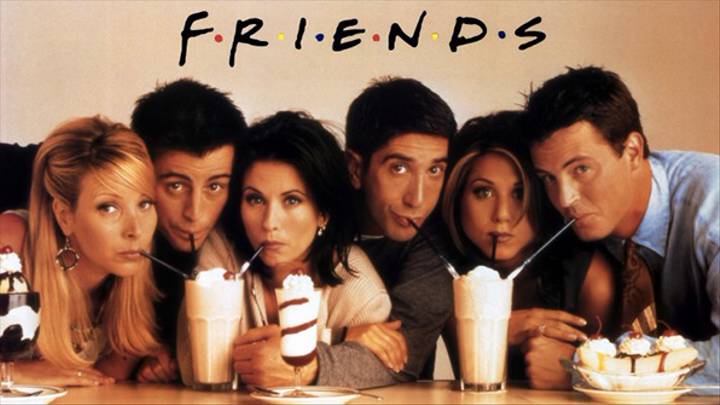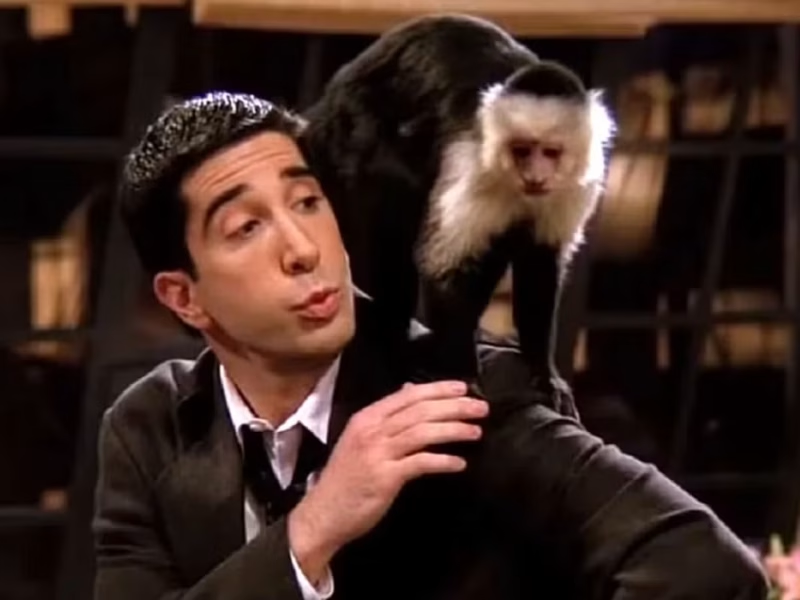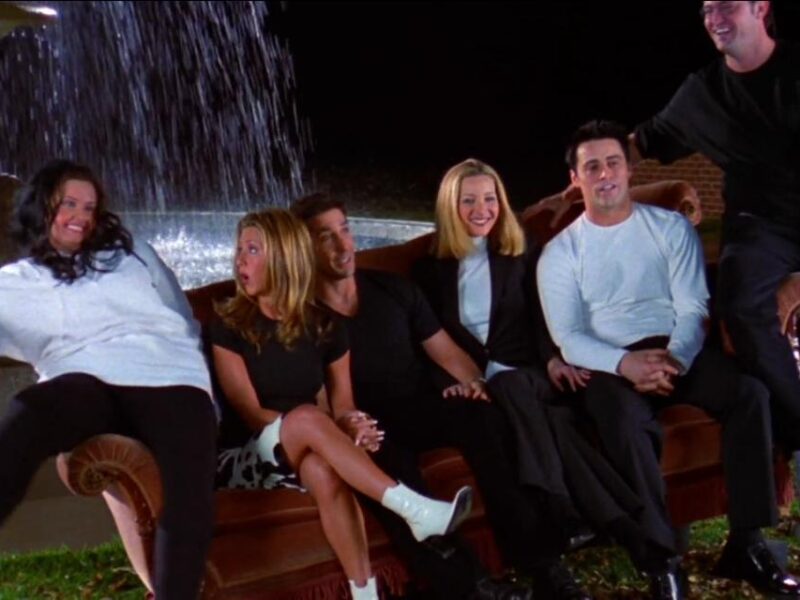Friends was a ensemble cast of 6 to act as one unit. When one character is singled out–say, Joey in a play–the rest react in unison with applause and in their feelings towards the show. Similarly, the friends are always equal in their “liking” or “disliking” of a friends’ boyfriend or girlfriend. While each character is defined, they focus on one at a time and have the rest act as an ensemble. For this alone, Friends receives warranted praise.
When Friends began in 1994, Chandler and Phoebe acted as auxiliary characters and the remaining four were to be the main cast.
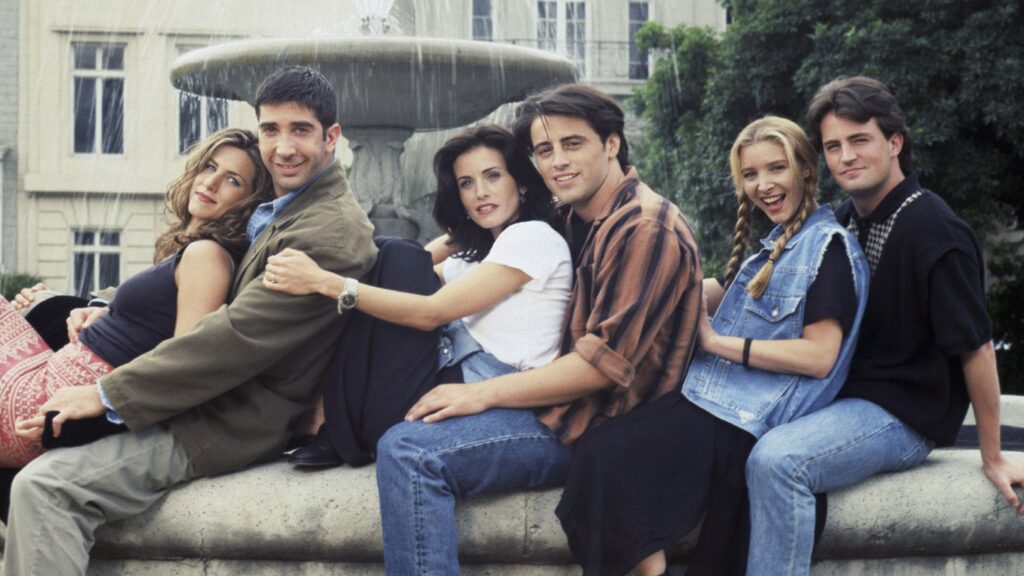
This dynamic is most prevalent in the 1st season and noticeably shifts as time goes on.
Regardless of the creators’ intentions, it was clear that no one was quite a “Chandler” or “Phoebe,” even if you had that friend, that friend probably thought of themselves as one of the others. Chandler and Phoebe filled that niche of crazy, over-the-top supporting cast. This is evidenced by their hyperbolic back stories.
Phoebe of course, features a runaway dad, identical twin sister, suicidal mother, and spent the remainder of her childhood making it on the streets of poverty.
Similarly, Chandler’s back story involves a transgender, cross-dressing father and a cougar mother, critically acclaimed for her erotica novels–likely as an homage to Raymond Chandler. And, although briefly present, Chandler was also set up to be a huge Star Trek fanatic.
In any case, these are characters written to be funny because of their character, not the situation. Chandler is funny because everything’s a joke when your life is that ridiculous, and Phoebe reminisces on her time as a homeless woman, stabbing people for food.
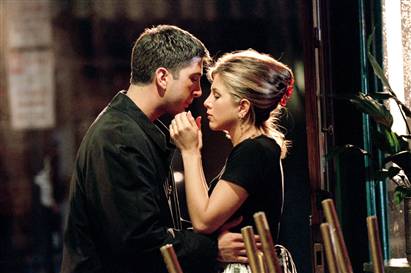
Juxtaposed then to these two extremes are Ross Geller and Rachel Green.
Rachel Green represents the polar opposite of Phoebe. Phoebe lived on the street whereas Rachel was born with a silver spoon in her mouth. Rachel’s character is equally hyperbolic to Phoebe, but on the opposite spectrum.
When the show begins, Phoebe is on her way up, but Rachel is on her way down — foregoing her security blankets.
Likewise, Ross represents the opposite of Chandler, he was a straight-A student, achieved all his dreams–becoming a paleontologist–, beloved by his parents, and was happily married for 8 years. Contrast this lifestyle with Chandler who works at a job that pays the bills, but isn’t what he wants to do, is incredibly bitter towards his parents for ruining him, and has had few romantic endeavors with no long lasting relationships.
Additionally, if any of the friends are to be considered “adult,” it’s Ross — the responsible, divorced father — and if any are to be considered a “child,” it’s Chandler — the wise-cracking, immature, sexually frustrated boy. It’s fitting that the two would be roommates in college — a sitcom that writes itself.
When the show begins, Ross is in the middle of a divorce from his pregnant lesbian wife. Ross is on his way down while Chandler is on his way up. This is also worth noting because, Chandler’s “up” is that he has finally distanced from his parents, he has a good-paying job, and has a new found friendship in Joey.
So, with opposite ends of the spectrum covered (Phoebe/Rachel and Chandler/Ross), then you have Joey and Monica who, were not only intended to be the romantic relationship of the series (commentary from creators), but are also the most versatile in story.
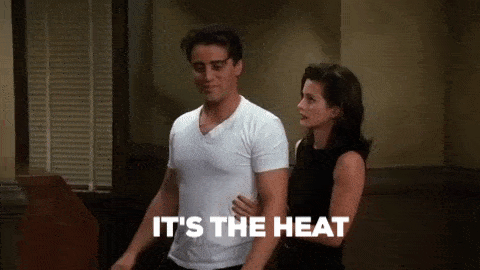
Joey, in the early seasons, actually has a great deal of depth. While the joke is always that he’s a poor actor, this was clearly done initially as irony to contrast with his very methodical character. In the early seasons of Friends — because I cannot stress enough that his IQ decreases exponentially as the seasons progress — Joey actually has depth. He’s not a successful actor, and only struggles with stable work; his odd jobs are the source of much situational comedy.
Despite the difficulty with jobs, Joey does not struggle with the ladies. The notches on his belt could only be rivaled by Monica’s — the true protagonist of the series.
This is what helps to make Joey the middle ground. He has both ups and downs. He’s not the smartest, but he’s not the dumbest — he’s average. If Joey was a successful actor, he would be completely unrelatable — as evidenced later in a miserably hour-long “What If” episode.
Joey is opposite Chandler in occupation and opposite Ross in personality. He is the most flexible male character. They further play upon his ups and downs with him becoming a model… for a VD awareness ad; he gets a role in a movie… as Al Pacino’s butt.
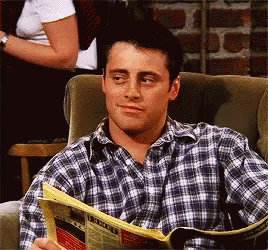
All these help to make Joey the everyman. From these descriptions it should be obvious that, if a viewer was given the choice, they’d want to be Joey over Ross and Chandler–especially for the targeted demographic.
However, Monica Geller is the main character of Friends, it was set-up from the beginning.
First, she complements Phoebe in that she had a difficult childhood — albeit more relatable. Her parents were unloving and Monica was the source of ridicule being obese.
Both Phoebe and Monica can pool that misery together, but the difference is Monica is much more grounded in reality. No one has a cohesive family, so it’s fitting that Monica would represent that. Additionally, Monica’s plight with her family is what made her all the more motivated to start a life on her own.
She doesn’t work a great job, but it pays the bills. In that sense, her job mirrors Joey’s sources of income, but a bit more stable. Again, her work becomes the source of situational comedy because like most college graduates, she is looking for work in a field she loves, but is incredibly competitive. Because of this, she epitomizes young adults who will lie and hyperbolize their resumes to get the job that will put them a step closer to their dreams — similar to how Joey colors his resume with lies about what he can do as an actor.
More than that, it’s clear Monica’s apartment is the central location for all ten seasons of Friends and as such, it is riddled with all sorts of symbols and hidden meanings — but that’s a different topic.
To top it off, Monica’s role in the show begins as a teacher to Rachel. Monica stands as the mediator because Rachel may have been above it all in high school, but now she’s entering the real world, and as Monica puts it “Welcome to the real world, it sucks–you’re gonna love it.”
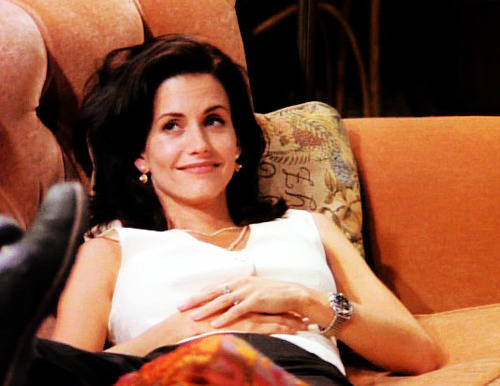
Monica is representative of every American woman in their mid-20s, looking for love and a job she can actually care about. She’s automatically likable since she takes Rachel — a prissy, spoiled brat — under her wing. This is what Rachel had done for Monica in high school. Now Monica gets to relive her past, but now she’s the educator and it’s a far more pertinent matter.
But whether Monica taking Rachel under her wing is due to maternal instincts, compensation for her help in high school, or genuine friend loyalty is up for debate.
The bottom line is Monica is the anchor for all the friends.
In many episodes, Monica’s arc is characteristic of the modern woman. She dates guys, but doesn’t get a call back, feeling used and often times like she’s “easy.” This makes her all the more likable because she’s not throwing herself to the dogs, but truly cares about people; the tragedy is the love is never reciprocated, so she’s a the perfect protagonist for unrequited love. It may sound similar to Chandler, but due to gender stereotypes, Chandler’s unrequited love is deemed pathetic and desperate, whereas Monica’s is heroic.
The One With The Fake Monica
An episode that’s particularly definitive of Monica’s status as modern woman is in the 1st season, “The One with the Fake Monica.” Which is about a woman who steals Monica’s credit card and spends the money frivolously. Yet the comedy comes from the fact that the real Monica (Courteney Cox), who goes by “Manana” in the episode, is jealous of the fake Monica.
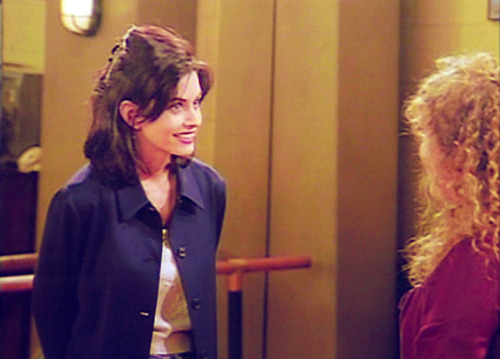
The fake Monica does not have to worry about money, so she spends her time getting drunk, taking tap dancing lessons, auditioning for a broadway show. Her days are full of fun, because she’s not tied to the laws of the real world. “Manana” sees this in her credit card bill and seeks her out, but not so much for justice as for vicarious fulfillment. “Manana” wishes she could just have fun all day, but she can’t because she has bills and rent and groceries to buy. This is the plight of our society — at the very least, as Americans.
Eventually the fake Monica is put behind bars, and Manana tries to continue living on the edge when she goes to the tap dancing class alone and performs — however wrong — in class. She does this to prove she can do this on her own. This self-sufficiency is what everyone wants to be and in this case, the studio laughter/applause actually adds to the experience since Monica’s tap-dancing is horrible, but we respect and appreciate that she’s doing it — most of us would not. In that sense, we use Monica vicariously as the character did for the fake Monica — it’s these moments that make Friends a worthwhile series and not simply another sitcom; it is why Friends is worth analyzing.
However, as the series progresses there’s a dramatic shift in character where suddenly, Rachel becomes the middle ground, Monica becomes the far right and Ross share the middle ground while Joey is reduced to a caricature.
Joey Tribbiani
Although, I’ve never watched Joey, I don’t blame Matt LeBlanc for wanting to define this character. Joey has a great deal of material to work with in the early seasons. In fact, he’s usually the down-to-earth character that provides wisdom and advice for the majority of the cast.
Additionally, he does fall in love with Ursula and dates her over the course of several episodes. He completely shifts gears and becomes monogamous and starts to express his feelings. He was never against this, but Joey had always come across as a “one-night stand” kind of guy. His range in the 1st season is rewarding.
Contrast this Joey with Joey in season 8,9, or 10 in which his IQ plummets, he becomes far more successful and falls out of character since he’s no longer down-to-earth. This coupled with his sudden interest in Rachel made him borderline intolerable.
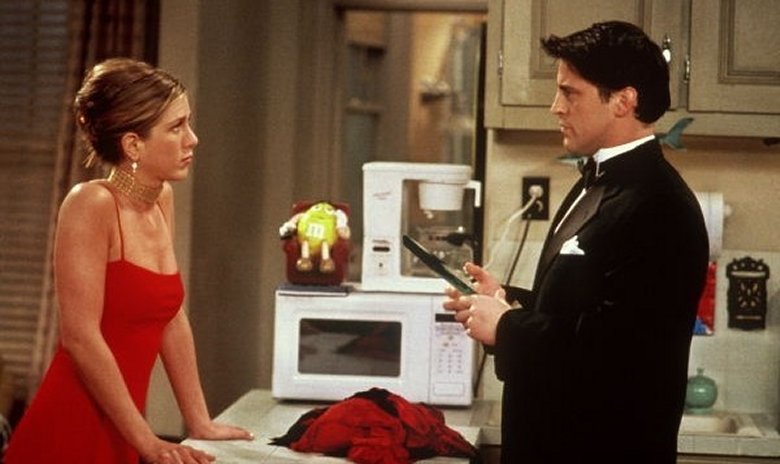
Of course, this is the result of too much fan service.
Joey and Rachel were roommates for several seasons and it worked marvelously. The show adapted the shift from Joey and Chandler to Joey and Rachel. This dynamic was as different as it was progressive — and it worked!
However, no doubt some viewers saw this as “Wow, they’d be such a cute couple,” because they are a cute couple, but not romantically — a cute roommationship, is closer to what they were.
This is why fans were divided with the Joey and Rachel romance. Half said, “What the hell are you doing?” and the others said, “What do you mean? They’re perfect together. Haven’t you been watching?”
But truthfully, this is a bit of a digression from the current matter.
That is the shift in Joey’s character dramatically and comically is abysmal. It’s genuinely shocking how stupid Joey becomes.
Joey’s vocabulary is the first-to-go in later seasons whereas in Season 2’s The One with the Lesbian Wedding, he can articulate, “I’m sorry, the pigs are reluctant to get into the blankets,” but in season 8, he’s confusing the words “horizontal” and “vertical.”
Now, Joey has never been the smartest, but usually humor was around naivete rather than stupidity.
To give an example compare Season 3’s The One with the Giant Poking Device with Season 9’s The One in Barbados:
Joey: Ross, if the Homo sapiens, were in fact, “Homo sapiens…” is that why they’re extinct?
Ross: Joey, Homo sapiens are people.
Joey: Hey, I’m not judging!
Compare that dialogue to season 9 when…
Joey just finished laughing at erectus.
Rachel laughs.
Joey: erectus?
Rachel: Homo
Joey laughs.
Essentially this is the same joke, but notice that one features a naive man trying to better understand something. The second features an ignoramus laughing at words that describe people.
This shift is a slap in the face.
An even better example of Joey’s transition comes in the 3rd season when Joey develops a crush on his costar Kate — played by the gorgeous and talented Dina Meyer.
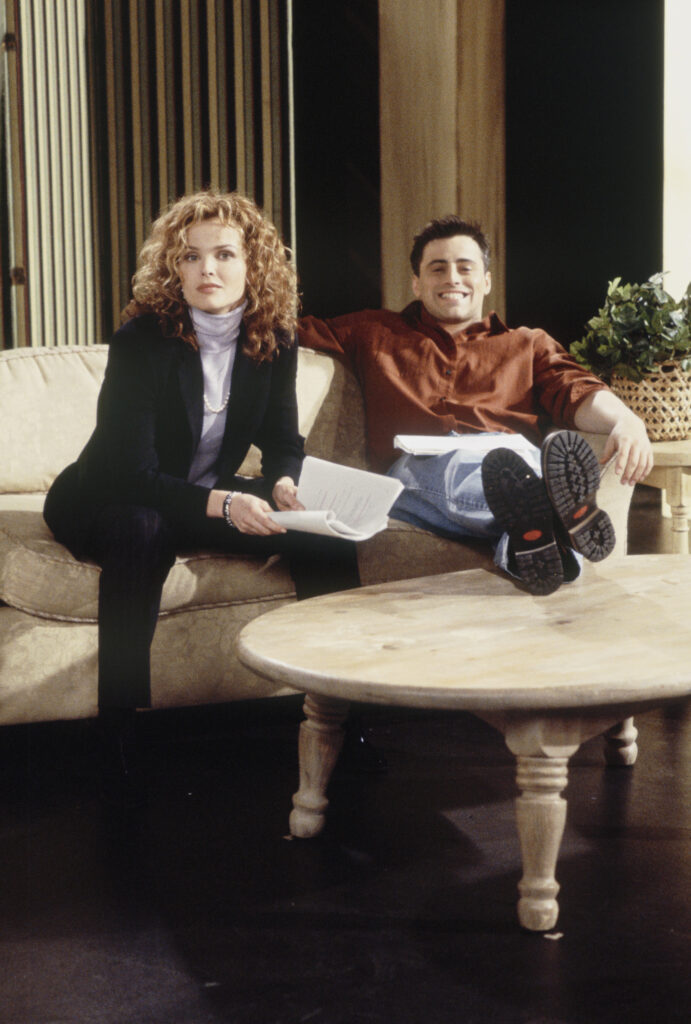
Joey’s feelings for her are genuine and he grapples with his feelings and tries to determine how she feels about him. As opposed to Ursula who is cut out of his life, Kate is present all through the play process making his unrequited love all the more palpable and unrelenting.
This relationship is an example of how Joey handles love, not like he did with Rachel.
It’s not hard to see that Joey’s character development doesn’t simply stop, but regresses. They ran out of material and the character becomes an afterthought — consider how many season finales don’t involve Joey.
The only thing they manage to do is move his career forward by reclaiming his role on a soap opera and being featured in more films. Because Joey has always been good with the ladies, he was now successful and attractive. The only thing Joey did not have was intelligence, so they exploited that to make him more grounded… but this doesn’t save him.
But what happened?
Chandler Bing
It started in Season 3 when Chandler finally takes Janice on as a serious relationship. They started to develop Chandler as this extremely sensitive person who makes copious mistakes but only wants the best. He started getting more of a story arc and when he and Janice break up, Chandler’s depression mirrors Monica’s — the lead’s — depression when she and Richard broke up. Sad or depressed people are a staple of audience empathy. Any character down on their luck are immediately relatable.
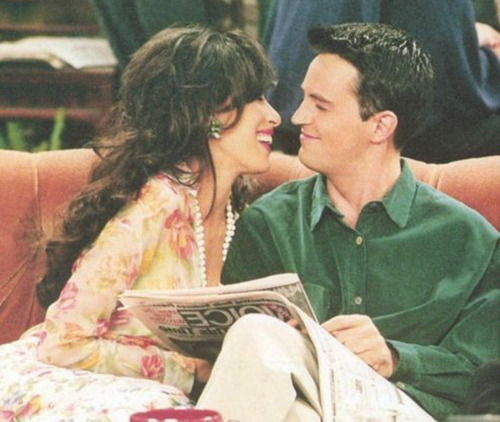
As a result, Chandler’s love affairs only get worse when he falls in love with Joey’s lady, Kathy. Chandler’s struggle between friendship and love is grueling and it hurts to watch him sleep on the couch in Monica’s apartment so that he doesn’t have to listen to Kathy and Joey fornicating.
This exploration of Chandler clearly gave the writers a lot to work with, so much so, that he became the focal point.
When Monica and Chandler got together then, he had sealed his position as the leading protagonist. And, while in the image, I feature him in the center, truth be told, by the end of the series he migrates further right because he becomes relatable to anyone who is secure in their marriage and wanting to have kids. This is evidenced by the fact that Chandler never hangs up his “pun” or “joke” -cap, but rather alters its use. Whereas Chandler made jokes out of insecurities in the earlier seasons, Chandler makes jokes out of comfort in the later seasons.
But this is an interesting point to note because Joey and Monica were supposed to be the focal point of the series, so how did the Chandler/Monica thing happen?
The creators have stated that it was a gamble and thrown in last minute. The reason for Monica and Chandler sneaking around was meta-textual because the creators did not want to make it official until they knew the audience reaction to it.
Their sneaking around — which is certainly a hallmark of the 5th season — was a result of the creators’ own insecurities about how people would take to the romance. Of course, when they did, they let it go public.
Up until marriage, the Chandler/Monica romance kept Chandler in the middle of the chart, and since then it fluctuates back and forth from middle to further on. It’s clear from Monica and Chandler’s relationship that Chandler is secure, confident, and happy. These things put him at the opposite end of the spectrum, so to level him out, they made it so that he and Monica couldn’t have babies… while I believe this was a mistake, it does keep Chandler in the middle zone.
With that said, before delineating into Ross, it’s a good time to explain Monica’s shift given her connection to Chandler.
Monica’s relationship with Chandler still kept her in the middle ground, but she has had to fight for that spot ever since Ross and Rachel.
Ross & Rachel Romance
The creators (Kauffman, Crane & Bright) said that Ross and Rachel was intended to be a season long romance, not an ongoing story throughout all 10 seasons, but the fans loved them together. This is clearly a testament to the actors’ abilities. Schwimmer and Aniston had a great deal of chemistry and their archetypes were so perfectly balanced.
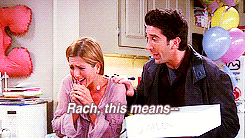
In many ways, Rachel was a student. She was learning the ropes, how to make money, how to aim higher, become self-motivated, etc. Ross has always been the most intelligent and therefore an inherent teacher.
Noticeably, their relationship begins to deteriorate when Rachel gets her first “real” job. She’s no longer trapped with a meager paycheck but is actually pursuing what she loves and is increasingly passionate about it. In a sense, she’s graduated from her apprenticeship and this inevitably makes Ross a jealous and insecure man because before she was dependent on him.
Truthfully, this is what leads to the destruction of their relationship and the steps taken to break them up is one of pure, magnificent choreography. The “Xerox girl” is introduced early in the season and Rachel’s gradual progression in the fashion industry increases with the ongoing tension.
The One with the Morning After is one of the few “bottle” episodes that takes place almost entirely in Monica’s apartment. The honest and brutal fight between the two is counterbalanced by the comedy of the remaining four in Monica’s room.
Even after this episode, the gradual steps taken to make Ross and Rachel friends again is phenomenal. It was a season clearly thought out from start to finish.
However, Rachel’s growth in profession and relationships is what made her shift from that whiny, spoiled girl to a modern woman. Unlike Ross and Chandler however, who both own the middle zone as well developed characters with ups and downs, Monica slides upwards on the scale, making her more and more hyperbolic.
Monica Geller
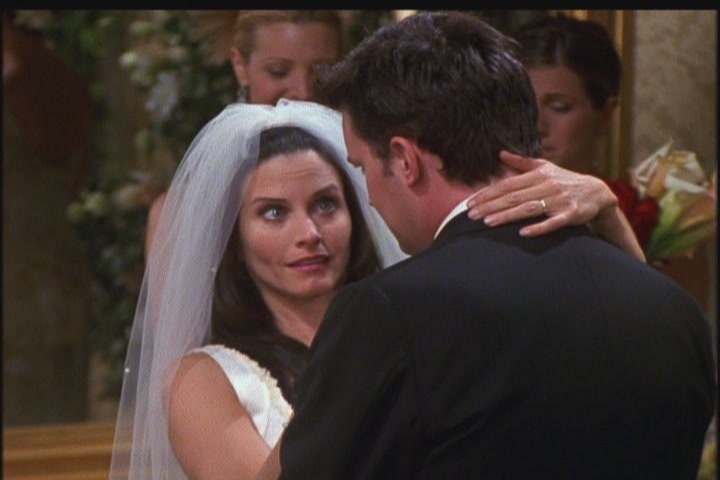
This happens as an unfortunate consequence of Monica dating Chandler.
Monica never got over Richard but it’s clear that she’s with Chandler because she can control him.
Monica was always reserved with Richard, never exposing him entirely to her neurosis. This was partially because Richard was older and wiser, but also because she respected him. Richard had a calming affect on Monica, Chandler does not. Chandler is flighty, immature, and anything but a safe bet. However, in knowing that she was the best Chandler would ever do, she knew she could control him.
(Note: It may seem like I’m saying they were in an abusive relationship, but let it be known that I like the Monica/Chandler relationship. I think they work and are incredibly happy together, however I stand by that Richard and Monica are soul mates.)
Monica has always wanted control and in that sense, Chandler is very fulfilling, however because Rachel never left center stage, Monica was once again–in the meta-narrative–competing against Rachel for progress. By the time Monica is married, she’s in love with her man and owns her own restaurant. Then Rachel beats her by getting pregnant.
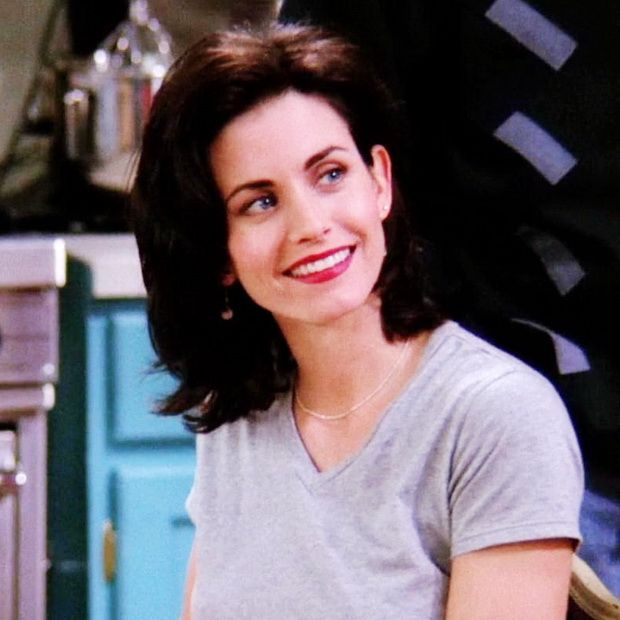
Monica’s marriage ended her character development altogether. With the exception of her difficulty having kids (which I still protest was unnecessary), Monica didn’t have to struggle she could just be.
So, similar to Joey and how his success and attractiveness made the creators exploit his one flaw — stupidity — so too, they do the same with Monica.
Her career success and marital success, meant that they took her neurotic behavior to the nth degree. Although Monica had always been a bit of a neurotic, it was contained in the harsh reality of life. When her life became great, there were no more restraints.
Monica becomes a cartoon in her obsessive compulsive disorder. She has more energy than any other character and becomes incredibly squeaky as the series progresses. The best Monica moments happen in Season 2 and Season 3, when she’s dating Richard and when she’s depressed after ending it with Richard. Monica has always been a better character when she struggles day-to-day.
(Obviously, she didn’t need to remain stagnate, but I’m actually curious what they would’ve done if she simply had a baby like she intended after she and Richard broke up. She could’ve also opened up her own restaurant or could’ve become a business owner of a number of chains of restaurants and the conflict could be the difference between making money and cooking as–being the owner, she’d be out of the kitchen and into an office.)
Monica was happy and secure, which, to me, counteracts her shining moment in The One with the Fake Monica. Monica sought improvement over stability. This was a girl who was being robbed–drained of money–but wanted to experience life to its fullest. She’d foregone security for excitement and proved she could still get that excitement on her own.
Monica is extremely independent and she always asked, “Is there something wrong with me?” when it didn’t work out with men. Truthfully, there probably is, but that’s something to embrace. A strong, female role is necessary, and while Monica is in control of Chandler, she’s so neurotic about it that we mock her for it. Even Chandler seems to be equally in charge as he knows she’s crazy–as do we all–but puts up with it because he loves her.
Chandler: I love you in spite of all those things.
While Chandler and Monica’s inability to have a baby added some depth and comedic moments–and certainly connected with people who I’m sure are in the same predicament–the fact remains that Monica should have been able to have a baby. Her character needed to be a mother sooner.
Ultimately, that’s one of my ongoing dilemmas with Friends is that, as they progressed, changes needed to happen faster for developments to occur as organically as the Ross/Rachel breakup and subsequent amicability.
